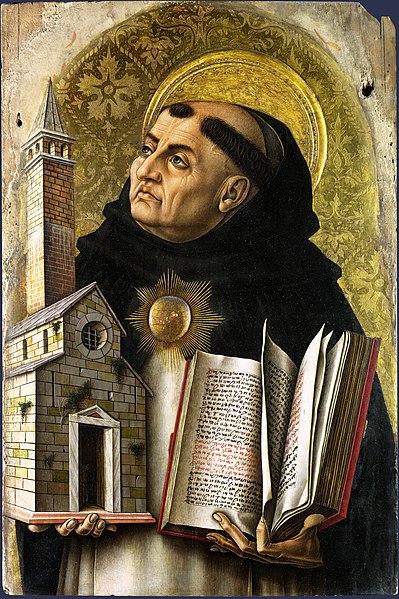
In the past, some have called the years from 500-1200, “the Dark Ages,” starting with the closing of Plato’s Academy in AD 529. Similarly, the very term, “Renaissance” means “rebirth,” suggesting that culture and thinking was “dead” before around 1400. Although not quite as judgmental, the term “Middle Ages” suggests that the more important history was before 500 and after 1500.
However, many important events took place during this period, and the years from 1000-1500 in particular included several very important Christian thinkers. We want to mention three in this section: Anselm of Canterbury, Thomas Aquinas, and William of Ockham. Anselm is one of many Christian thinkers who were significantly influenced by the Greek thinker Plato. Aquinas reflects the deep impact of the Greek philosopher Aristotle. Then Ockham represents a way of thinking called nominalism, which may have influenced Martin Luther, the “father” of Protestantism.
Anselm: A Platonic Vision
Saint Anselm of Canterbury (1033-1109) was a Benedictine monk, archbishop, and one of the foremost philosophers of the 1000s. He is often associated with a “Platonic” view of reality. (Plato was a pre-Christian philosopher who lived from around 429-347 BC.) Anselm’s thinking, like so many Christians today, reflected the strong influence of Platonic “idealism.” Plato believed that ideas are real and that the material things around us are only shadowy versions of the ideals.
Anselm’s Ontological Argument
- The idea of God as the greatest possible Being exists in my mind, “that than which nothing greater can be thought.”
- But this concept cannot be the greatest unless God actually exists outside my mind.
- Therefore, God must exist outside my mind.
Anselm’s most famous contribution to Christian thinking was an argument for God’s existence, called the ontological argument. To a large extent, Anselm’s argument amounts to his sense that because we can conceive of God clearly with our minds, God must truly exist. For him, the ultimate, true reality behind this world that we can see and touch is a world of ideas.
Anselm also was the first to formulate the satisfaction theory of atonement in something like its modern form. Prior to Anselm, most Christians thought of Christ’s death as a sort of ransom paid to the Devil to free humanity from sin (ransom theory of atonement) or perhaps as Christ defeating the Devil (Christus Victor). Anselm was really the first to formulate atonement as Jesus paying a debt that humanity needed to pay but that only God could pay. Because Jesus was both fully human and fully divine, only he could pay humanity’s debt. For Anselm, this was “why God became human,” the title of his most famous writing.
Many Christians today operate more or less as Platonists. C. S. Lewis, for example, believed that God must exist because Good has to be real outside of human culture and feelings. In his moral argument for the existence of God, Lewis sees goodness as something that stands outside of the world as a standard by which events in the world can be measured. When Christians talk about a “Christian worldview,” they are typically thinking Platonically.
Thomas Aquinas: An Aristotelian Synthesis

Thomas Aquinas (1225-1274) was a Dominican friar and one of the most important Christian thinkers of all time. He is known for his synthesis of Christian theology with the philosophy of Aristotle. (Aristotle was a pre-Christian philosopher who lived from around 384-322 BC.) Unlike Anselm's Platonic idealism, Aristotle relied much more on observation of the world than contemplating ideas.
Aquinas's most significant work was the Summa Theologica. It was a monumental attempt to reconcile faith and reason. Aquinas argued that reason and faith do not conflict with each other. Rather, they complement each other in the pursuit of truth. Aquinas believed that many theological truths, though ultimately grounded in divine revelation, could also be reached or supported by rational argument.
If Anselm made an argument for God’s existence based on ideas, Aquinas made an argument based on observation. For example, Aquinas (like Aristotle) thought that everything that moves must have had someone give it a push. Therefore, since the world is in motion, there must have been a “First Mover.” Aquinas said that this Mover was none other than God. This argument is a version of what is known as the cosmological argument for the existence of God.
If some Christians think Platonically, others think like Aristotle. When Josh McDowell wrote a book called, Evidence That Demands a Verdict, he was more or less following the approach of thinkers like Aquinas. They believe in universal truths that we can infer by observing the world. Similarly, some scientific creationists might easily be classified as Aristotelian thinkers.
William of Ockham: A Nominalist Critique
 William of Ockham (ca. 1287-1347) was an English Franciscan friar and philosopher. He challenged both Platonism and Aristotelianism, arguing that they made up connections between things that weren’t real. Good is whatever God commands it to be, not some set of rules that God himself must obey (divine command theory). Similarly, the evidence doesn’t necessarily “demand” a verdict. Rather, you’ve got to have faith. Kierkegaard would later talk about a leap of faith in the 1800s. Fideism, an approach that says faith doesn’t need to have a rational basis, is basically nominalist.
William of Ockham (ca. 1287-1347) was an English Franciscan friar and philosopher. He challenged both Platonism and Aristotelianism, arguing that they made up connections between things that weren’t real. Good is whatever God commands it to be, not some set of rules that God himself must obey (divine command theory). Similarly, the evidence doesn’t necessarily “demand” a verdict. Rather, you’ve got to have faith. Kierkegaard would later talk about a leap of faith in the 1800s. Fideism, an approach that says faith doesn’t need to have a rational basis, is basically nominalist.
The impact of nominalism laid the groundwork for Martin Luther arguing that individual faith was central to salvation. Nominalism shifted the focus from what is true “up there” to what is true for me as an individual. It is not the truth that the church has told me. It is the truth as I find it myself in the Bible.
Ockham is perhaps best known for “Ockham's Razor." The principle here is that the simplest explanation, with the fewest assumptions, is usually the correct one. This principle encouraged a more experimental approach to knowledge, focused on what you can observe rather than the abstract speculation that had prevailed before.
You can see the nominalist influence today among those who focus more on their individual understanding and experience than on tradition. You can find it in those who talk about blind faith. You can find it in those who see God’s will as something they simply must obey, not necessarily something that is part of an overarching worldview or set of universal principles.